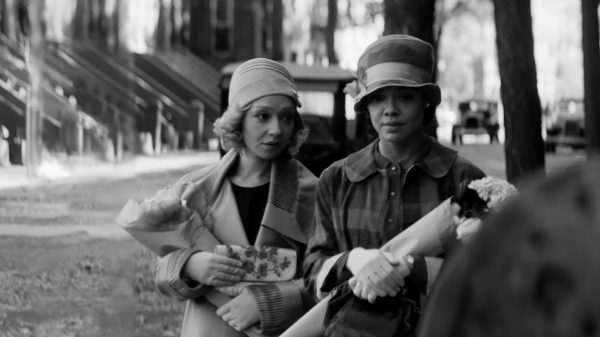Passing, 2021.
Written and Directed by Rebecca Hall.
Starring Tessa Thompson, Ruth Negga, André Holland, Alexander Skarsgård, Bill Camp, Gbenga Akinnagbe, Antoinette Crowe-Legacy, Justus Davis Graham, Ethan Barrett, Ashley Ware Jenkins, and Amos J. Machanic.
SYNOPSIS:
Passing follows the unexpected reunion of two high school friends, whose renewed acquaintance ignites a mutual obsession that threatens both of their carefully constructed realities.
The reality of white privilege is not lost on me, so the core concept of a Black woman during the 1920s New York passing for white to lead a life on equal footing is certainly tantalizing and ripe for social probing. Based on the novel of the same name by Nella Larsen, writer and director Rebecca Hall (making a directorial debut that was positively received at this year’s Sundance) has more or less chosen to adapt Passing sticking as close to the page as possible, which works to a point considering the filmmaker has opted for rich black-and-white cinematography that ties the usage of monochrome colors into its thematic storytelling (especially when Christmas time snow rolls around), yet doesn’t necessarily translate into something emotionally involving beyond the outstanding central performances from Tessa Thompson and Ruth Negga.
Beginning with Irene (Thompson) and Clare (Negga) catching up, the former learns that her high school friend is now passing for white and married to a man named John (Alexander Skarsgård), oblivious that she is of African-American descent. He also happens to be a racist, unafraid to casually drop slurs while coining a repugnant nickname for Clare, who is no longer as white as when they tied the knot. Of course, Clare willingly putting herself in such a situation doesn’t exactly make her a likable character (she enjoys the luxury and wealth that comes with being married to a rich white man, fortunately giving birth to a white child), but an undeniably intriguing one to dissect and understand.
Passing chooses to center its story on Irene, naturally turned away by Clare’s actions and wanting nothing to do with her anymore. Besides, she has her own family to look after, married to Andre Holland’s Brian and raising two sons. The peace within the marriage begins to fracture when the boys become the target of racially motivated bullying, and Clare’s unannounced visit after receiving no response to her written letters. Brian may disagree with what Clare is doing, but they begin to strike up a friendship seeing eye to eye on racial politics more than he does with Irene. Essentially, the makings of a love triangle are underway as the perspective sticks to Irene, disapproving of the developing bond and nervous that she could lose her husband.
This should also make for riveting drama by design, but while the acting is fantastic for everyone involved, it never truly heats up. Rebecca Hall seems incapable of really getting into the minds of these characters, only able to scratch the surface of the complicated themes at play. I can’t fault Passing for not focusing on Clare more (her character is, ugly as it may be, the refreshing one here worth spending more time with, moral gray areas and all). Still, I can wonder what could have been if Rebecca Hall had tried to adapt the material in a more dynamic and balanced way that elevated the dramatic tension for all involved. Eduard Grau’s photography is gorgeous to look at, and the actors assuredly know how to sell Passing, but it too often feels bare-bones with missed opportunities.
All things considered, Passing still would have been an easy recommendation simply for the ideas and concepts of racial identity it’s tackling. At least until the botched and rushed ending that there’s not much of anything to make of beyond theorizing about the specifics of a particularly tragic incident. In the end, its themes only exist to push the story along rather than allow for intricate and thoughtful introspection. Rebecca Hall certainly has a feel for the atmosphere and knows how to give the film a symbolically beautiful look, but she might benefit from working alongside a writer next time. Regardless, it’s admirable that someone is trying to dive into murky waters surrounding racial identity that deserve to be addressed.
Flickering Myth Rating – Film: ★ ★ / Movie: ★ ★ ★
Robert Kojder is a member of the Chicago Film Critics Association and the Critics Choice Association. He is also the Flickering Myth Reviews Editor. Check here for new reviews, follow my Twitter or Letterboxd, or email me at MetalGearSolid719@gmail.com














